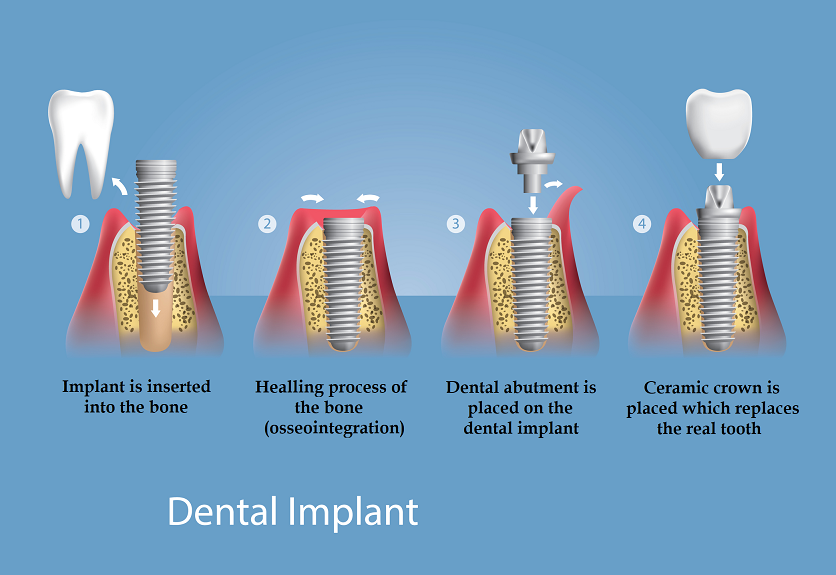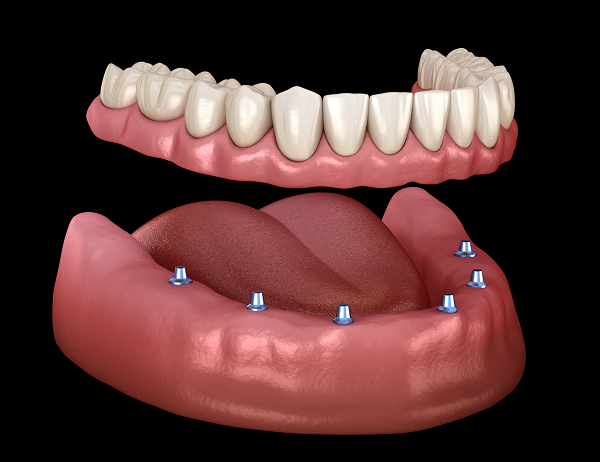Dental Implants
Transform Your Smile with Dental Implants:
A Comprehensive Solution for Every Need
Dental implants are a revolutionary solution for replacing missing teeth, meticulously designed to replicate the natural structure and function of your teeth. Each implant consists of two key parts: the crown, the visible part used for chewing, and the titanium root, which securely anchors the tooth into the jawbone. This biocompatible, durable root not only provides stability but also helps prevent bone loss, maintaining your natural facial structure and overall oral health.
Video: Teeth Shifting Because Of Missing Teeth
Why Choose Dental Implants?
Dental implants have become the gold standard for tooth replacement for several compelling reasons:
- Prevention of Bone Loss: Implants are the only solution that prevents the bone resorption that occurs when a tooth is lost, preserving the integrity of your jawbone and preventing the sunken facial appearance associated with missing teeth.
- Preservation of Adjacent Teeth: Unlike traditional bridges, dental implants do not require the alteration of neighboring teeth, keeping your healthy teeth intact and reducing the risk of future dental issues.
- Long-Term Success: With a documented success rate of over 95%, dental implants offer a reliable, lasting solution that often requires less maintenance over time compared to other options.
- Cost-Effective: While the initial cost may be higher, the longevity and durability of dental implants make them the most cost-effective choice in the long run.
Types of Dental Implants We Offer
We offer a variety of dental implant types to suit your individual needs:
- Endosteal Implants: The most common type of dental implant, endosteal implants are surgically placed directly into the jawbone. Once the surrounding gum tissue heals, a second surgery is required to connect a post to the original implant, followed by the placement of an artificial tooth (crown) on the post.
- Zygomatic Implants: Zygomatic implants are used when there is insufficient bone in the upper jaw for traditional implants. They are anchored in the cheekbone (zygoma) rather than the jawbone, offering a secure foundation for the dental prosthesis.

Image: Implant Stage Diagram
Video: Implant-Supported Bridge
Explore Our Range of Dental Implant Procedures
Depending on your specific needs, we offer the following dental implant procedures:
- Single Tooth Implants: Ideal for replacing a single missing tooth, this procedure involves placing one implant and attaching a custom-made crown. It looks, feels, and functions like a natural tooth, providing a seamless replacement.
- Implant-Supported Bridges: When multiple teeth are missing, an implant-supported bridge is an excellent solution. This option uses implants as anchors for the bridge, eliminating the need to cut down adjacent healthy teeth and offering greater stability and durability.
- Full Arch Implants (All-on-4/All-on-6): Designed for patients who have lost most or all of their teeth, full arch implants involve placing four to six implants in the jawbone to support a full set of replacement teeth. This procedure provides a fixed, permanent alternative to traditional dentures, offering superior comfort and function.
- All-on-4 Implants: This innovative technique allows for a full arch of teeth to be supported by just four implants. It’s a cost-effective and efficient option for those who need extensive restoration, often allowing for immediate placement of temporary teeth on the same day as the surgery.
The Unique Benefits of Dental Implants
Dental implants offer a range of advantages that make them the preferred choice for tooth replacement:
- Maintain Facial Structure: By preventing bone loss, dental implants help maintain the natural contours of your face, avoiding the sunken look that can occur with missing teeth.
- Restore Your Natural Appearance: Dental implants are crafted to match the look and feel of your natural teeth, ensuring that your new smile blends seamlessly with your existing teeth.
- Protect Surrounding Teeth: Since implants do not require the alteration of neighboring teeth, they help preserve your overall oral health and prevent further dental complications.
- Built to Last a Lifetime: With proper care, dental implants can last a lifetime, making them a wise long-term investment in your oral health.

Picture: Implant Hybrid Locators

Discover the Benefits of Dental Implants
If you’re considering tooth replacement options, dental implants provide unmatched benefits for restoring your smile and preserving your oral health. Whether you need a single implant, a bridge, or a full arch restoration, our team is here to help you achieve the best possible results.
Call us today at 302-273-8300 to schedule your consultation and learn more about how dental implants can transform your smile.
Frequently Asked Questions
Who is a Good Candidate for Dental Implants?
Most people who are in good general health and have sufficient jawbone density are good candidates for dental implants. However, factors such as chronic illnesses, smoking, or certain medications might affect the success of the implant. A thorough evaluation by a dental professional is necessary to determine eligibility.
How Long Do Dental Implants Last?
With proper care and maintenance, dental implants can last a lifetime. The crown or prosthetic attached to the implant may need to be replaced over time due to wear, but the titanium implant itself is designed to be a permanent solution.
Is the Dental Implant Procedure Painful?
Most patients report minimal discomfort during the dental implant procedure, as it is typically performed under local anesthesia or IV sedation. Post-operative discomfort can usually be managed with over-the-counter pain medications and should subside within a few days.
What Is the Recovery Time After Getting Dental Implants?
Initial healing after the implant placement usually takes a few days, but it can take several months for the implant to fully integrate with the jawbone (a process called osseointegration). Most patients can return to work the day after surgery, but physical activities should be limited for a short period.
How Do I Care for My Dental Implants?
Caring for dental implants is similar to caring for natural teeth. Regular brushing, flossing, and routine dental check-ups are essential. Additionally, avoiding hard or sticky foods and not using your teeth as tools can help prolong the life of your implants.
What Are the Advantages of Dental Implants Over Other Tooth Replacement Options?
Dental implants offer several benefits, including preserving jawbone health, maintaining facial structure, providing a natural appearance, and not requiring alteration of adjacent teeth like bridges. They also offer superior stability compared to dentures.
Are Dental Implants Safe?
Yes, dental implants have been used safely and effectively for decades. They are made from biocompatible materials like titanium, which is accepted by the body and fuses with the bone to create a stable foundation for the replacement tooth.
How Much Do Dental Implants Cost?
The cost of dental implants can vary depending on factors such as the number of implants needed, the type of restoration, and the complexity of the procedure. While dental implants may have a higher upfront cost compared to other options, they are a long-term investment in your oral health.
Will My Insurance Cover Dental Implants?
Coverage for dental implants varies depending on your insurance plan. Some dental insurance plans may cover a portion of the cost, while others may not cover implants at all. It’s important to check with your insurance provider to understand your benefits.
What Is the Success Rate of Dental Implants?
While dental implants have a high success rate (over 95%), there are rare instances where they may fail. Factors that can contribute to implant failure include poor oral hygiene, smoking, insufficient bone density, and certain medical conditions. Regular dental visits and proper care are crucial to the long-term success of implants.
What Should I Expect During the Dental Implant Procedure?
The procedure typically involves multiple stages. First, the implant is surgically placed into the jawbone. After a healing period where the implant integrates with the bone, an abutment is placed on top of the implant, followed by the attachment of a custom-made crown. The entire process can take several months to complete.
Can Anyone Get Dental Implants?
While most people are candidates for dental implants, some may require additional procedures like bone grafting and/or sinus lift for upper teeth to ensure enough bone is available to support the implant. Those with certain health conditions or insufficient bone may need to explore other treatment options.
Can Dental Implants Be Used to Replace Multiple Teeth?
Yes, dental implants can be used to replace a single tooth, multiple teeth, or even an entire arch of teeth. Depending on the number of missing teeth, options such as implant-supported bridges, full arch implants, and All-on-4 implants may be recommended.
Can I Get Dental Implants If I Have Gum Disease?
Gum disease can affect the success of dental implants, so it’s important to treat any gum disease before undergoing implant surgery. Your dentist will evaluate your oral health and may recommend periodontal treatment to address gum disease before proceeding with implants.
These FAQs are designed to provide potential patients with a comprehensive understanding of dental implants, helping them make informed decisions about their tooth replacement options.
